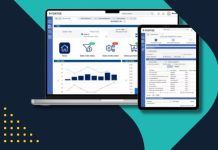
How did you come to join Infor back in 2002?

“In the first place? That’s an interesting anecdote. At the time, Jim Schaper was about to acquire a company in Germany (Brain International), and Golden Gate was funding that acquisition.
“I was in another small Golden Gate portfolio company. They asked me to support Jim because all of a sudden, they found out there’s a Works Council, and people didn’t speak English well and didn’t understand private equity.
“Jim asked me to join those meetings and the due diligence in the Frankfurt area. He then asked me to run the business for him. He literally said: ‘You asked all the right questions; you have the job.’
“Kevin was in those meetings too; it was in 2000/2001. I was the first (Infor) hire from a non-acquired company in Europe. It was a 400-500 people company at that time.”
Why did you leave Infor in the first place? Was it maybe a bit too wild?
“I was there for nine years; we had a very different strategy, and it was about time to do something else. At that time, I joined a BI firm (Qlik) when BI became a hot topic. I wanted to do something cool and not maintain a couple of iSeries and AS400 products. Now I’m back into an even hotter place with multi-tenant cloud strategy, transformation to SaaS and all these things.”
Why return to Infor?
“As you may have seen on my LinkedIn profile, I was with Infor from 2002 to 2010. Those were the times when we acquired a lot of companies. It added up to about 16, so it was a wild time. Then I left for 11 years. Why did I come back?
“First, I got a call from Kevin saying I have a crazy idea. Then he walked me through the company strategy, the new culture, and being owned by Koch Industries. He walked me through a new product strategy and our multi-tenant strategy. The focus that Infor has now is on customers with the right vertical solution.
“It all made me happy to return because a great culture, great people and a great strategy sounded like a good recipe for success. Ultimately, you have a lot of fun working when you have success, and it sounded to me that we have the right strategy in place.”
The importance of International to Infor
Kobek is now GM of International, which includes 65% of the Infor employee base and 40% of its revenues. Customers make up 54% of the customer base, which is now more than 60,000. The division is also growing quickly, with EMEA growing at 18% SaaS revenue compared to 2020 and APAC growth is around 18%. On average, regional growth was 26%, indicating that EMEA is the larger business segment.
What is the opportunity for the international division?
“The opportunity is huge. With the dynamics in the market, the ship blocking the Suez Canal, Ukraine, China, and COVID, customers are reviewing supply chains. We have great tools that can help. There is a lot of dynamic in the market when it comes to converting to the cloud. There are cyber security challenges if you have on-prem and vs on Cloud. We have great solutions here.
“From a technology and market dynamic point of view, there’s a tremendous opportunity. Then also, regionally, we haven’t scratched the surface when it comes to China. China will undoubtedly become the largest manufacturing country in the world. We’re just starting there as a company and as an industry.
“I truly believe in the products and the focus we have in dedicated verticals; we can add so much business value to customers that I see a huge opportunity to grow the business.”
How far ahead of the game is Infor in terms of industry focus and technology?
“From a technological point of view, we are a couple of years ahead. Our competition is not close to where we are. With our Industry Focus, we are providing more business value. We’re driving more business outcomes than a lot of our competitors.
“You can buy a horizontal solution and spend a lot of time and money to make it work. Or, you can buy a solution that is made for your particular industry. That’s the way we are going. That’s what Koch industries brought us to.”
On challenges
What are the key challenges you feel that international faces?
“First, there’s the macroeconomics, which has caused huge market uncertainty. We need to see how we can carefully grow the business. How can we drive customer outcomes in such an air of uncertainty where customers become very careful in spending money?
“The other challenge is we’ve been going through a transformation. We still have a lot of on-prem customers, which we offer to transform into a multi-tenant cloud product.
“For us, as a company, and for the team here, how do we transform our go-to-market accordingly, because selling a multi-tenant cloud solution is certainly different than selling an on-prem solution or maintaining an on-prem solution. That is in terms of sales enablement, consulting services, and enabling our partner ecosystem.”
What’s your key personal challenge in your current role?
“I took over a well-run business in good shape. Let’s make no mistake; this is not a broken business. My personal challenge is to keep the momentum and then find the areas where I can drive efficiency and where we can do things smarter while not breaking anything.”
What keeps you up at night?
“In this role, it is mainly about the people. In the industry, attrition is increasing. There’s a lot of competition out there hunting for your people. It’s providing the people with a culture they feel comfortable with so that they stay in the business. It’s about enabling them so that they can be successful. Who is successful in his current or her current role does not have the intent to leave. It is then providing a platform for success and enjoyment within the business.
“We’re trying to get more people back to the office. We’ve got back to Office initiatives without forcing anyone. If you’re just on Teams, you don’t create the culture and don’t interact with people as you would in an office. All these connections between the people make culture and creates a working environment you enjoy.
“My strategy here is to enable and build the platform for success, and you only can do that if you interact, cooperate, and collaborate with your teammates. You can’t build a culture on Teams. What keeps me awake is how to provide this platform. How can we ensure people do not leave because someone is paying 3% more? That should be irrelevant because you’re successful and enjoying what you’re doing.”
On the future
How do you see international change in the next two years? And how do you see yourself creating that change?
“First of all, we put all the right things in place, the Industry and vertical focus, the transformation to cloud and SaaS. We’re adjusting the go-to-market accordingly—driving the pipeline in dedicated verticals.
“We’re not selling everything to everyone, we’re selling one solution to car manufacturers’ distribution, food and beverage, and the verticals we selected. The transformation from a go-to-market perspective reflects our company’s strategy and vision and is certainly something we’ve put in place and will change over the next two years.
“With that, we also need to create and build a larger partner ecosystem. That is also an adjustment in our go-to-market. We can only scale and grow if we have a large partner ecosystem that is enabled, provides quality to customers, and drives customer outcomes.
“That is a process. We can’t do that in three months, which takes up to two years. But we are ready to invest in it. We’ll be ready to go that way and talk to the GSIs and larger reselling partners. Big changes have been made. Now it’s about transforming International to address that and implementing it accordingly.”
What do you hope to achieve by the end of the financial year?
“First of all, of course, I want to achieve the budget numbers, which means in a difficult environment, currently continuing to execute and hit the numbers accordingly. Beyond the financial numbers, I want to 100% implement our industry vertical focus and drive our pipeline and opportunities in our core industries. We are convinced we can derive the best customer outcome in those industries. Align the team accordingly so we do what we can do and do not do what we are not so good at.
“Secondly, get the investments approved and started in the areas we want to grow. I mentioned China, how can we support the growth there, how can we support customers and prospects in China to support them in the growth and provide business value to them.”
On international expansion
You’ve already hired two new leaders in international Kerry Koutsikos in MEA and Isabella Kusumawati in SEAK. What are your aims for those two regions?
“The Middle East is an important part of the business. You’ve got Saudi, where you have huge and significant IT spending, according to IDC, and it’s an incredibly growing market. You’ve got the Emirates there, where we have certain verticals around distribution that we can address. And, of course, South Africa, which is also a significant market. We have identified the right verticals for each market and have significant growth expectations.”
What about the rest of Africa, for instance, Nigeria, where Zoho recently launched?
“Nigeria is a difficult market. It is potential, but it’s a difficult market to do business there. Sometimes it’s not in line with our standards. We currently cover those countries through partners only. We’re following them, watching them, and ensuring that everything is according to our corporate governance. It’s not a market we’re investing in.”
Kobek continued, “We have a hyper-growth strategy and plan for APJ. If we want to grow above industry standard, China is one of the markets where we invest heavily. Japan is a market where we’ve been investing heavily, and what Isabella covers in Asia also has significant growth rates. That’s why we are over-investing in those areas: we see the potential and growth.”
The Book question
What was the latest book you read, and what was your take out for business from that?
“I wish I had the time to read more. I read the Charles Koch book, Good Profit (Amazon Aus, UK, US), which is a great book, of course! The one that helped me a lot in my daily business is by Ben Horowitz, the founder of a fund called Horowitz and Andreessen. He wrote two books, which are both great. The last one is really cool, ‘What You Do Is Who You Are’ (Amazon Aus, UK, US).
“I just read this in before I joined Infor. It says that your culture has two elements. Firstly, it should reflect you, what you are and what you do, and it should be built on your strength and beliefs. Then you have to really, really execute against your strength and your beliefs and build this into the culture. You have to walk the talk and be the leader that is driving that culture. So it’s an interesting book, and I can recommend that one.”

























